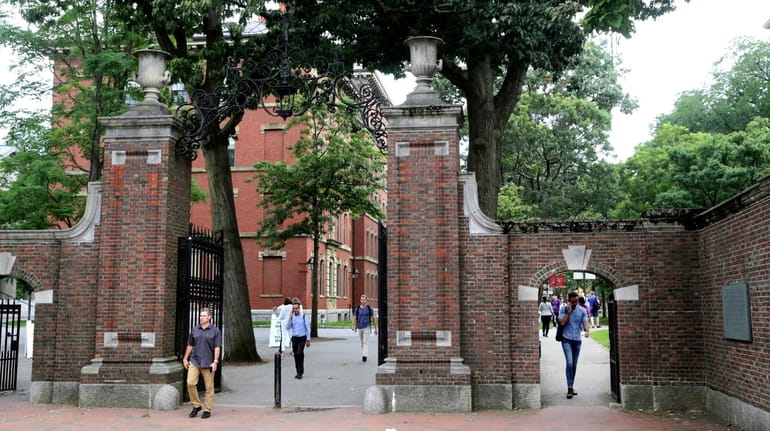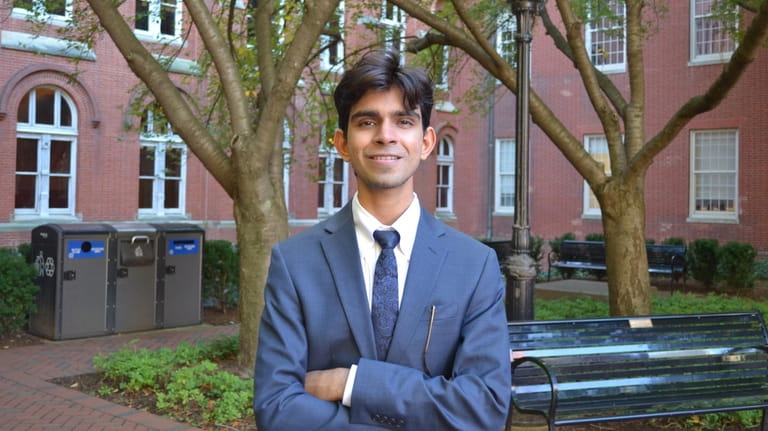Trying to weaponize the weaponless

Harvard is among several institutions and businesses that challenged the Trump administration's decision to bar international students from staying in the U.S. if they take classes entirely online this fall. Credit: AP/Charles Krupa
The Trump administration once again tried to weaponize foreigners. If the trigger had been pulled this time, these so-called non-resident aliens would have been the first to get hurt.
Last week, Immigration and Customs Enforcement said that international students would lose their student visa status should their universities adopt online instruction in the fall academic year. Those currently in the United States would have had to exit or “face immigration consequences.” Those planning to arrive on campus this fall would have suffered, too — no visas for them.
Fortunately, to the relief of thousands of international students in U.S. colleges, Harvard and MIT took ICE to court, leading the administration to reverse course on Tuesday.
Now that the storm is ostensibly over, let’s not be quick to forget the deeper messaging behind last week’s regulation — an announcement that joined President Donald Trump’s signature canon of controversial immigration reforms.
But let’s be charitable when judging Trump. The 2017 travel ban on seven Muslim-majority countries: Poor biometric information posed national security risks. The 2018 zero-tolerance policy in separating asylum-seeking adults from their children: Preserving rule of law is important. The 2019 Public Charge Rule: Immigrants shouldn’t burden our welfare system. The suspension of select family-based immigration this year: American jobs must go to Americans. This was also the argument for suspending the H-1B worker visa program in June.
This is a generous reading of policies that allegedly foster xenophobia, desensitize family separations, and fracture American values. But at least these effects were wrapped in the rhetoric of protecting American interests. Not this time. The administration made no attempt to rationalize its decision to move on student visas.
Because it couldn’t. At a time when the world is grappling with a pandemic, no amount of logic could link this policy to Trump’s national security goals. Why threaten deportation weeks before the start of the semester? Why hold students accountable for decisions that only universities can make?

Ali Shahbaz is a 2020 Georgetown University graduate. He studied in the Walsh School of Foreign Service. Credit: Ali Shahbaz
The answer: International students had become the latest guinea pigs in Trump’s experiments for saving face. Rising unemployment, weak polling, and poor market performance have debunked the myth of Trump’s economic miracle. Trump’s in hot water and he knows it.
Still, it’s not so simple. To the naked eye, Trump’s response to the Black Lives Matter movement, threats to deploy the military on protesters, and the now-rescinded regulation on international students will inevitably hurt him in November.
Wrong. The calculated steps supply his voter base with a booster shot of the Trumpian appeal — radically disruptive and politically tone-deaf. The actions are also an attempt to expand Trump’s influence in places that are unreachable for his fingers: educational institutions. Treating international students as bargaining chips for universities to adopt his reopening model is vile. It’s degrading and strips international students of the little agency they ever had.
It was a close call. I say this because the biggest loser here would’ve been America — and that’s why nearly 20 state attorneys general and some of the nation’s largest tech companies and universities went to court to block the administration’s rule. If such policies prevail, our economy will lose benefits brought by internationals, universities will lose enrollment revenue, and research centers will lose cutting-edge technologists, scholars, and innovators. But these minds wouldn’t be lost in a vacuum; they will set off elsewhere.
It’s time then to stop treating students as collateral damage in this political circus.
Ali Shahbaz is a 2020 Georgetown University graduate. He studied in the Walsh School of Foreign Service.
